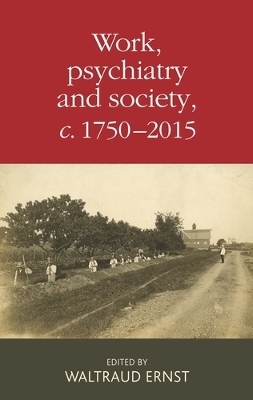
Work, Psychiatry and Society, c. 1750–2015
Manchester University Press (Verlag)
978-1-5261-2709-9 (ISBN)
This book offers the first systematic critical appraisal of the uses of work and work therapy in psychiatric institutions across the globe, from the late eighteenth to the end of the twentieth century. Contributors explore the daily routine in psychiatric institutions and ask whether work was therapy, part of a regime of punishment or a means of exploiting free labour. By focusing on mental patients’ day-to-day life in closed institutions, the authors fill a gap in the history of psychiatric regimes. The geographical scope is wide, ranging from Northern America to Japan, India and Western as well as Eastern Europe, and the authors engage with broad historical questions, such as the impact of colonialism and communism and the effect of the World Wars. Work, psychiatry and society presents an alternative history of the emergence of occupational therapy and will be of interest not only to academics in the fields of history and sociology but also to health professionals. -- .
Waltraud Ernst is Professor of the History of Medicine at Oxford Brookes University -- .
Introduction: Therapy and empowerment, coercion and punishment: historical and contemporary perspectives on work, psychiatry and society – Waltraud Ernst
1. The role of work in late eighteenth- and early nineteenth-century treatises on moral treatment in France, Tuscany and Britain – Jane Freebody
2. Therapeutic work and mental illness in America, c. 1830–1970 – Ben Harris
3. Travails of madness: New Jersey, 1800–70 – James Moran
4. From blasting powder to tomato pickles: patient work at the provincial mental hospitals in British Columbia, Canada, c. 1885–1920 –Kathryn McKay
5. ‘Useful both to the patients as well as to the State’. Patient work in colonial mental hospitals in South Asia, c. 1818–1948 – Waltraud Ernst
6. ‘A powerful agent in their recovery’: work as treatment in British West Indian lunatic asylums, 1860–1910 – Leonard Smith
7. Work and activity in mental hospitals in modern Japan, c. 1868–2000 – Akira Hashimoto
8. Patient work and family care at Iwakura, Japan, c. 1799–1970 – Osamu Nakamura
9. Work and occupation in Romanian psychiatry, c. 1838–1945 – Valentin-Veron Toma
10. Between therapeutic instrument and exploitation of labour force: patient work in rural asylums in Württemberg, c. 1810–1945 – Thomas Müller
11. The patient’s view of work therapy: the mental hospital Hamburg-Langenhorn during the Weimar Republic – Monika Ankele
12. They were ‘improved’, punished and cured: the construction of ‘workshy’, ‘industrious’ and (non-)compliant inmates in forced labour facilities in the First Republic of Austria between 1918 and 1938 – Sonja Hinsch
13. Useful members of society or motiveless malingerers? Occupation and malingering in British asylum psychiatry, 1870–1914 – Sarah Chaney
14. Work and the Irish District Asylums during the late nineteenth century – Oonagh Walsh
15. From work and occupation to occupational therapy. The policies of professionalisation in English mental hospitals from 1919 to 1959 – John Hall
16. Work is therapy? The function of employment in British psychiatric care after 1959 – Vicky Long
17. The hollow gardener and other stories: reason and relation in the work cure – Jennifer Laws
Index -- .
| Erscheinungsdatum | 10.05.2021 |
|---|---|
| Zusatzinfo | 20 black & white illustrations, 2 tables |
| Verlagsort | Manchester |
| Sprache | englisch |
| Maße | 156 x 234 mm |
| Gewicht | 553 g |
| Themenwelt | Geisteswissenschaften ► Geschichte |
| Medizin / Pharmazie ► Gesundheitswesen | |
| Medizin / Pharmazie ► Medizinische Fachgebiete ► Psychiatrie / Psychotherapie | |
| Studium ► Querschnittsbereiche ► Geschichte / Ethik der Medizin | |
| ISBN-10 | 1-5261-2709-1 / 1526127091 |
| ISBN-13 | 978-1-5261-2709-9 / 9781526127099 |
| Zustand | Neuware |
| Informationen gemäß Produktsicherheitsverordnung (GPSR) | |
| Haben Sie eine Frage zum Produkt? |
aus dem Bereich


